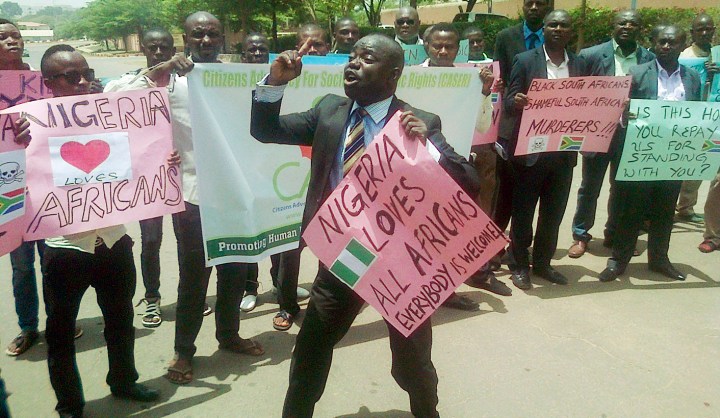Africa, South Africa
Africa: The new South Africa has never been so unpopular

Even before the current outbreak of xenophobic violence, South Africa wasn’t the most popular kid in the African bloc. In its wake, however, our image lies in tatters and there are continent-wide protests outside our embassies (the likes of which have not been seen since the international anti-apartheid movement targeted the regime’s diplomats). Even though President Jacob Zuma has moved swiftly to mollify angry African governments, the damage has already been done – and there will be a price to pay. By SIMON ALLISON.
We’ve said it before, and we’ll say it again: South Africa has an image problem.
In much of the western world, where the country is disproportionately represented by white South Africans, many of them in self-imposed exile, we face an uphill battle to convince people that not all South Africans are racist. In Africa, meanwhile, it’s a struggle to overcome the arrogance of our foreign policy (typified in how we bullied the African Union into accepting Nkosazana Dlamini-Zuma as commission chairperson); the dominance of our commercial interests, which funnel so much of Africa’s disposable income down south and suck up so much cultural space (consider the pre-eminence of DStv, and the spread of Shoprite and Debonairs and Mr Price); and our brazen, offensive indifference to the crucial role played by African countries in our own liberation.
But hey, we’ve got Nelson Mandela, and the rainbow nation, which compensates just about enough to neutralise the bad vibes. But the tensions remain, and resentment is not far from the surface. It doesn’t take much to bring it out into the open.
Which is why it should come as no surprise that, in the wake of the sustained xenophobic attacks in South Africa, parts of the continent have been quick to register their disapproval.
In Mozambique, South African vehicles were pelted with stones, and Mozambicans working with South African companies refused to work with their South African counterparts. Fearing violence, Sasol evacuated 340 South African workers.
In Zimbabwe, more than 100 people marched on the South African embassy in Harare, carrying a petition in solidarity with victims of “the cruel, senseless and gruesome xenophobic slaughter of foreign nationals and the looting of their properties in South Africa”. One rights activist was brutally assaulted by riot police, which is in itself a worrying symptom – when President Robert Mugabe’s thugs step in to protect the honour of the South African state, we know we’re in trouble.
In Nigeria, reports that the South African consulate in Lagos was stormed by angry protestors were inaccurate – but it is true that hundreds gathered to protest outside it and the High Commission in Abuja, as well as outside MTN’s headquarters in Abuja. The Nigerian foreign ministry summoned the South African ambassador to explain himself and express Nigeria’s disapproval. South Africa has now closed the Lagos consulate. At the same time, several militant groups have reportedly threatened to target South African businesses operating in Nigeria. “It is causing huge reputational damage,” said Chris Maroleng, MTN’s executive for group corporate affairs.
There were also protests outside the SA High Commissions in Malawi and Zambia, along with calls to boycott South African products. One Zambian radio station is refusing to play South African music.
These are all legitimate and, so far, non-violent responses to the vicious attacks in South Africa on nationals of these countries, among others. The embassy protests in particular should serve as a wake-up call. This is a form of protest usually reserved for the embassies of rogue states, such as Sudan and Syria, or serial human rights abusers like China or Israel. It was also a prominent tactic in the global anti-apartheid struggle.
Two decades later, is South African becoming a pariah state once more?
Desperate to stem the tide of resentment, President Jacob Zuma has reportedly despatched cabinet ministers across the continent, tasked with reassuring African governments that South Africa is taking the issue seriously, and doing everything in its power to prevent further attacks. International relations minister Maite-Nkoane also met with the African diplomatic corps in Pretoria to apologise for the violence. “It is therefore with a deep sense of pain and regret that we as the South African government humbled ourselves before the African diplomatic community in our meeting with them today; and we expressed, through them, our heartfelt apologies to the African continent and people for the actions of those of our citizens who have behaved in a shameful manner,” she said.
While the current outbreak of xenophobia has made life more dangerous for Africans in South Africa, it has also made life more difficult – and probably more dangerous too – for South Africans in Africa. It has irreparably tarnished the image of South Africa, even if that wasn’t so great in the first place, and emphasised the self-imposed divisions between us and the rest of the continent. It’s hard to quantify the long term effects of this. It’s fair to conclude, however, that no one wins. DM
Photo: A photo made available 22 April 2015 of the executive director of ‘The Citizens Advocacy For Social And Economic Rights’, Frank Tietie (C) speaking during a protest outside the South African High Commission over the xenophobic attacks in South Africa on Nigerians and other African nationals, in Abuja, Nigeria, 21 April 2015. EPA/STR

















 Become an Insider
Become an Insider